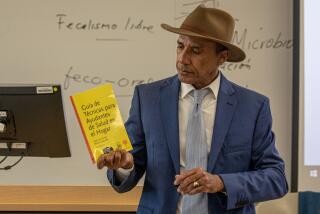Business Students Learn to Do as Foreigners Do : Culture gap: School puts focus on knowing language, blending in and avoiding the Ugly American syndrome.
- Share via
GLENDALE, Ariz. — Located at a converted air base in this suburb of Phoenix is a school training business students to immerse themselves in the cultures of foreign lands, to be less American.
“By the time they graduate, the students should be able to blend so well into other cultures that you can only tell where they’re from by their American passports,” says Roy Herberger, president of the American Graduate School of International Management, a private school nicknamed Thunderbird for the street it’s on.
“Our students are able to operate immediately in foreign environments.”
Herberger believes business people must become globalists rather than nationalists if they expect to compete overseas.
So the 1,650 students enrolled this fall at Thunderbird are constantly immersed in the language, culture and history of various countries from the minute they step onto the desert-site campus.
Such skills are more important than ever to American business as companies find themselves competing with the emerging economies throughout Europe, Southeast Asia and Mexico, Herberger says.
Charles Hickman, project and services director for the American Assembly of Colleges of Business, an accreditation agency, says Thunderbird has been drawing worldwide attention since it was founded in 1946.
“It started earlier and dug deeper,” Hickman says. “The school has intended to do one thing and has done it very well. They’re trying to graduate specialists who hit the ground running.”
Thunderbird graduates have been heavily recruited by Fortune 500 companies and have connections through more than 25,000 alumni scattered through 130 countries.
“We’ve been impressed with the adaptability Thunderbird graduates show toward relocating around the world,” says Manny Sousa, university employment manager at Mars Inc., which has offices in 50 countries and is the world’s largest maker of candy and pet food.
“The flexibility these graduates have, plus their international training and focus, make them attractive candidates.”
In addition to standard business classes, Thunderbird students are required to learn a foreign language, but Herberger says many arrive already speaking three or four languages.
Courses in the politics, religion and history that help mold a country’s economics are taught concurrently with language classes.
“So a student wanting to study Arabic will start with the Arabic language. Then they’ll also, alongside of it, start studying the politics of Islam,” Herberger says. “They’ll look at the cultural influence of the Saudis and the royal families. There are a lot of different things that go into the shaping of business practices of an area.”
Thunderbird’s immersion process is carried outside the classroom as well.
Foreign students make up about 30% of enrollment and have helped set the school apart from such leading business institutions as the University of Pennsylvania’s Wharton School and New York University’s Stern School of Business.
Richard Starke, who is working toward his master’s degree in international management--Thunderbird’s primary degree--says socializing with fellow students contributes as much to his education as course work.
“You learn their culture and find out what’s considered polite in their country,” says Starke, who earned an MBA from Rutgers University and left a career as a tax attorney to attend Thunderbird full time. “You find out how to present yourself socially and that’s where Americans fall short. Most don’t know how to behave overseas in a foreign environment.”
That kind of mutual understanding is a must when doing business overseas, Herberger says.
Herberger earned a doctorate in business from the University of Colorado in Boulder and headed the school of business at Southern Methodist University before joining Thunderbird’s staff three years ago.
Despite the reputation Thunderbird and its graduates have gained, Herberger says recent changes around the world--the collapse of the Soviet Union, the reunification of Germany, independence for the Baltic states--have pressed him to keep his faculty and students up to date.
To prepare his students for the changes, Herberger has plans.
A $10-million construction project providing a new residence hall and lecture hall and international studies buildings is nearing completion. In addition, a satellite campus is scheduled to open in January at En Champ, along the border of France and Switzerland.
The satellite will be Thunderbird’s second. A campus was opened in Japan two years ago.
More to Read
Inside the business of entertainment
The Wide Shot brings you news, analysis and insights on everything from streaming wars to production — and what it all means for the future.
You may occasionally receive promotional content from the Los Angeles Times.









